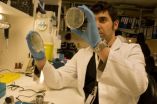(Press-News.org) Men who have been incarcerated and released are more than twice as likely to die prematurely as those who have not been imprisoned, according to a new study published by Georgia State University criminologist William Alex Pridemore.
Former prisoners are more likely to die early from infectious and respiratory diseases, drug overdoses and homicides. Causes of this "mortality penalty" include increased exposure to diseases like TB and HIV, the prolonged stress of the prison environment, the disruption of important social bonds and, upon release, the struggle to reintegrate into society and employment.
"We know that stress can weaken immune systems," Pridemore said. "And in a very unpleasant twist of events, at the precise moment when these men are most vulnerable to a compromised immune system due to stress – that is, when they are incarcerated – they are most exposed to a host of communicable diseases whose rates are much higher in the prison population."
Pridemore's empirical analysis of the Izhevsk (Russia) Family Study, was published online this month in the Journal of Health and Social Behavior. Titled "The Mortality Penalty of Incarceration: Evidence from a Population-based Case-control Study of Working Age Males," it is among the first sociological studies to look at the short- and long-term impacts of incarceration on the mortality of prisoners after their release.
More than 2.5 million people are incarcerated in the United States – 95 percent of whom will eventually be released. Incarceration rates in the United States and Russia, at 730 and 519 per 100,000 residents, are among the highest in the world.
"Earlier research looked at the collateral consequences of mass imprisonment that started in the 1970s, when the U.S. went on an incarceration binge. Most focused on incarceration's limits on job prospects and earnings, marriages and its impact on communities," he said. "Now research is turning to its impact on health.
"Ironically, prisons provide an opportunity to screen and treat a population that may be unlikely or unable to take advantage of community-based health care," he continued. "Prisons should work with inmates, prior to their release, and provide health screenings and treatment and help them plan for their short-term and long-term health care needs. This investment will benefit not only the individual health of current and former prisoners, but also taxpayers and the broader community by way of improved population health.
Pridemore's findings are timely given the recent release of the National Research Council's report, The Growth of Incarceration in the United States, which has politicians and the public reconsidering mass incarceration.
"Careful research shows that many of the consequences of contact with the penal system – especially the mortality penalty of incarceration – go well beyond what we consider just punishment," he said.
INFORMATION:
William Alex Pridemore is a Distinguished University Professor in the Andrew Young School of Policy Studies at Georgia State University. His research focuses on the social structure and violence and the sociology of health.
Released prisoners are more likely to suffer early death
2014-05-13
ELSE PRESS RELEASES FROM THIS DATE:
Forgiving a wrong may actually make it easier to forget
2014-05-13
We're often told to "forgive and forget" the wrongs that we suffer – it turns out that there may be some scientific truth behind the common saying. A study from researchers at the University of St. Andrews in Scotland shows that the details of a transgression are more susceptible to forgetting when that transgression has been forgiven.
The findings are published in Psychological Science, a journal of the Association for Psychological Science.
"It is well established that learning to forgive others can have positive benefits for an individual's physical and mental health," ...
Signal Fire in New Mexico
2014-05-13
Firefighters are currently battling the Signal Fire in the Gila National Forest in New Mexico. The fire was reported by the Signal Peak Lookout Tower Sunday (May 11) in the afternoon and is located approximately 15 miles north of Silver City. It is currently estimated to be 4,700 acres. The Southwest Area Incident Management Team assumed command of the fire Monday at 6:00 p.m. The cause of the fire is thought to be human either a careless camper or arson, but the investigation is still ongoing. Residents in the vicinity of Signal Peak have evacuated. The firefighters ...
Screening is 'not effective' in the fight against domestic violence
2014-05-13
One in three women around the world have experienced physical or sexual violence from a partner. Although domestic violence is associated with a range of adverse health impacts, even after the abuse has ended, it is not easily identified by health care professionals, prompting some countries, notably the United States, to introduce screening programmes in healthcare settings. A new study, published online by the BMJ today [13 May], has found no evidence to support domestic violence screening.
Researchers from the Universities of Bristol and Melbourne, La Trobe and Columbia ...
Surgery study shows worse health, more problems and higher costs among Medicaid patients
2014-05-13
ANN ARBOR, Mich. — Surgery patients covered by Medicaid come into their operations with worse health, do worse afterward, stay in the hospital longer and find themselves back in the hospital more often than those covered by private insurance, a new analysis by University of Michigan Medical School researchers finds.
In fact, people with Medicaid coverage were twice as likely as other patients to have certain health risk factors before they had surgery, the researchers report in JAMA Surgery. They also had many more emergency operations, experienced two-thirds more complications ...
New cancer immunotherapy aims powerful T cells against tumors
2014-05-13
Deadly skin cancers in mice shrank in response to a new treatment that may complement other "immunotherapies" developed recently to boost the body's own defenses against disease threats, according to a new study published by UC San Francisco researchers in the May 2014 edition of the Journal of Experimental Medicine.
Using a mouse version of a human drug that is popular for treating osteoporosis, the UCSF researchers discovered a way to manipulate the thymus, a gland situated at the base of the neck above the heart, to alter its activity so that some of the specialized ...
First year student publishes monsoon study
2014-05-13
A first year Environmental Science student at The University of Nottingham Malaysia Campus (UNMC) has had a literature review of the Southeast Asian monsoon published in the academic journal Geoscience Frontiers. Her research concluded that future climate warming could lead to a 15 day delay in the monsoon onset in Southeast Asia by the start of the next century.
Yen Yi Loo investigated how global and regional temperature and rainfall anomalies affect rainfall patterns and the South East Asian Monsoon. She also highlighted how increased rainfall intensity in the last ...
New agent may enhance effectiveness of radiotherapy
2014-05-13
Scientists from The University of Manchester – part of the Manchester Cancer Research Centre - have demonstrated the potential of a drug to improve the effectiveness of radiotherapy in stopping tumour growth.
There is increasing interest in using the body's own immune system to attack tumour cells – a strategy that can be very effective without the side effects associated with conventional chemotherapy.
Skin cancers have been successfully treated using a topical cream, imiquimod, which recruits immune cells through a molecule known as toll-like receptor 7 (TLR7), a ...
Arthroscopy of the knee joint for arthrosis: No benefit detectable
2014-05-13
The benefit of therapeutic arthroscopy with lavage and possible debridement for the treatment of arthrosis of the knee joint (gonarthrosis) is not proven. There was no hint, indication or proof of benefit of therapeutic arthroscopy in comparison with non-active comparator interventions, e.g. sham surgery, for any patient-relevant outcome. From the active comparator therapies, only the injection of glucocorticoids into the knee joint produced worse results than arthroscopy for the outcome "global assessment of the symptoms of gonarthrosis".
This was the result of the ...
Identified 2 new genes involved in the more aggressive prostate cancer
2014-05-13
A study by the Columbia University Nova York, in collaboration with the Catalan Institute of Oncology , Belvitge Biomedical Research Institute (ICO-IDIBELL) has identified two new genes that lead to more aggressive forms of prostate cancer. The work done by Alvaro Aytes under the direction of Cory Abate-Shen , director of the Herbert Irving Comprehensive Cancer Center of the Columbia University, has been published in the latest issue of Cancer Cell.
Prostate cancer
Prostate cancer is the most common in men in Europe( accounts for 20% of all male tumors). The incidence ...
A tale of survival
2014-05-13
Frankfurt am Main, Germany, May 12, 2014. Hydrogen sulphide (H2S) is a potent inhibitor of aerobic respiration. However populations of shortfin molly fish managed to colonise springs with high concentrations of dissolved hydrogen sulphide. In a new study researchers from LOEWE Biodiversity and Climate Research Centre (BiK-F) and the Goethe University Frankfurt present evidence of genetic changes minimizing the harmful effects of H2S which enable the fish to survive in this deleterious environment. The study provides insight into the molecular mechanisms of this key adaptation ...


